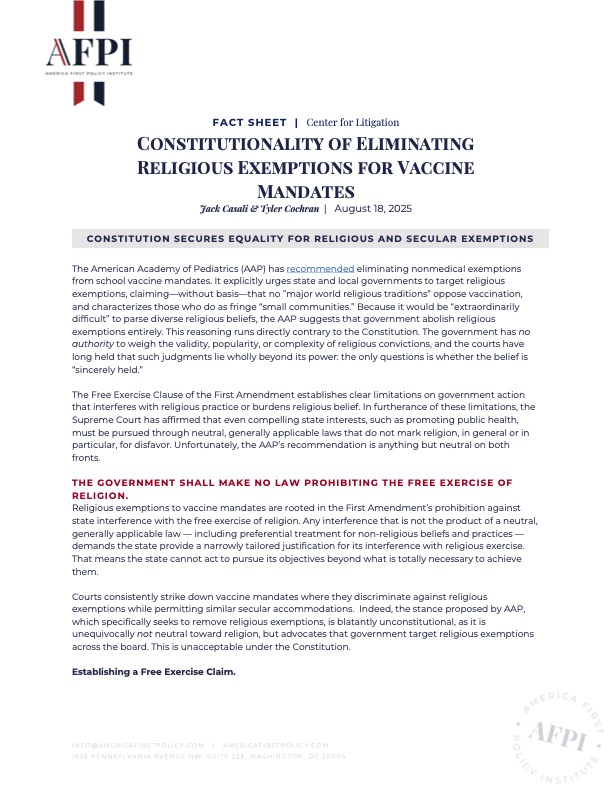Constitutionality of Eliminating Religious Exemptions for Vaccine Mandates
CONSTITUTION SECURES EQUALITY FOR RELIGIOUS AND SECULAR Exemptions
The American Academy of Pediatrics (AAP) has recommended eliminating nonmedical exemptions from school vaccine mandates. It explicitly urges state and local governments to target religious exemptions, claiming—without basis—that no ”major world religious traditions” oppose vaccination, and characterizes those who do as fringe “small communities.” Because it would be “extraordinarily difficult” to parse diverse religious beliefs, the AAP suggests that government abolish religious exemptions entirely. This reasoning runs directly contrary to the Constitution. The government has no authority to weigh the validity, popularity, or complexity of religious convictions, and the courts have long held that such judgments lie wholly beyond its power: the only questions is whether the belief is “sincerely held.”
The Free Exercise Clause of the First Amendment establishes clear limitations on government action that interferes with religious practice or burdens religious belief. In furtherance of these limitations, the Supreme Court has affirmed that even compelling state interests, such as promoting public health, must be pursued through neutral, generally applicable laws that do not mark religion, in general or in particular, for disfavor. Unfortunately, the AAP’s recommendation is anything but neutral on both fronts.
The government shall make no law prohibiting the free exercise of religion.
Religious exemptions to vaccine mandates are rooted in the First Amendment’s prohibition against state interference with the free exercise of religion. Any interference that is not the product of a neutral, generally applicable law — including preferential treatment for non-religious beliefs and practices — demands the state provide a narrowly tailored justification for its interference with religious exercise. That means the state cannot act to pursue its objectives beyond what is totally necessary to achieve them.
Courts consistently strike down vaccine mandates where they discriminate against religious exemptions while permitting similar secular accommodations. Indeed, the stance proposed by AAP, which specifically seeks to remove religious exemptions, is blatantly unconstitutional, as it is unequivocally not neutral toward religion, but advocates that government target religious exemptions across the board. This is unacceptable under the Constitution.
Establishing a Free Exercise Claim.
- If a state were to adopt the AAP’s recommendation and promote secular, scientific-based exemptions while explicitly disallowing religious exemptions, they would be at serious risk of violating the Free Exercise Clause on non-neutrality grounds.
- If a plaintiff shows that the state has burdened his or her sincere religious beliefs by disallowing religious exemptions, then the state bears the burden of satisfying strict scrutiny to rebut the presumption of a Free Exercise violation.
- The state must demonstrate its adoption of the AAP’s recommendation was justified by a compelling state interest such as public health.
- The state must demonstrate public health was the actual goal motivating their adoption of the AAP’s recommendation as opposed to animus for religion.
- The state must demonstrate it pursued public health through narrowly tailored means that are reasonable and least burdensome on free exercise.
- It is unlikely a court will find an outright ban on religious exemptions to be the least burdensome means of achieving public health goals. Especially if exemptions were permitted on other grounds.
- Enforcement inconsistencies that advance secular beliefs and/or target religious beliefs are not neutral. Therefore, the AAP’s recommendation is presumptively unconstitutional.
- If a plaintiff shows that the state has burdened his or her sincere religious beliefs by disallowing religious exemptions, then the state bears the burden of satisfying strict scrutiny to rebut the presumption of a Free Exercise violation.
- The Constitution requires religious beliefs be sincere but do not require theological consistency or formal dogma.
The AAP’s proposal strikes at the very core of the First Amendment, inviting government to do precisely what the Free Exercise Clause forbids — to police, rank, and ultimately erase religious conviction from public life.
